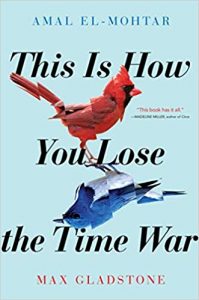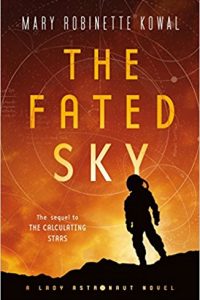Liz Bourke and Amy Goldschlager Review This Is How You Lose the Time War by Amal El-Mohtar & Max Gladstone
 This Is How You Lose the Time War, Amal El-Mohtar & Max Gladstone (Saga 978-1-5344-3100-3, $19.99, 200pp, hc) July 2019.
This Is How You Lose the Time War, Amal El-Mohtar & Max Gladstone (Saga 978-1-5344-3100-3, $19.99, 200pp, hc) July 2019.
A novel – or rather a novella – that does find me part of its enthusiastic readership is Amal El-Mohtar & Max Gladstone’s first traditionally published collaboration, This Is How You Lose the Time War. Holy shit. Holy shit. Holy shit. This is the time-travelling queer epistolary romance I didn’t know I needed. This is the time-travelling queer epistolary romance you should definitely read, because while I’m not entirely sure I can do it justice in a review, I am entirely sure it’s an excellent work that – if there’s any justice in the world – we’ll see on awards lists next year.
El-Mohtar (Hugo and Nebula Award-winning author of “Seasons of Glass and Iron”) and Gladstone (award-nominated author of Ruin of Angels and Empress of Forever) have combined their striking talents in a slender volume that’s as impressive and as affecting as it is brief. It starts with a letter marked “burn before reading.” Out of this unlikely beginning arises a correspondence that should never have existed, between two agents on the opposite sides of a war that stretches throughout time and space: rivals who know each other by their work. Red belongs to the Agency, a post-singularity technological civilisation. Blue belongs to the Garden, a consciousness embedded in organic matter. They have bloody histories and they’re bent on futures where the other is dead, defeated, or never-to-have-existed at all. They have nothing in common.
They have a lot in common. They’re the best at what they do. They’re alone. They want to win – but they also want to be seen by someone who can understand and appreciate what they have done and can do: they want the acknowledgement of knowing the best of the other side knows they’re better.
At first. It starts as a game. It starts as a battlefield boast. It grows into something stranger, stronger, fiercer, something that can say,
I want to scorch the thousand earths between us to see what blooms from the ash, so we can discover it hand in hand, content in context, intelligible only to each other. I want to meet you in every place I have loved…
…I write to you in stings, Red, but this is me, the truth of me, as I do so: broken open by the act, in the palm of your hand, dying.
It’s an epistolary romance between spies. Of course there’s betrayal, heart-breaking betrayal, one used against the other; of course there’s striving, there are reversals, there’s unexpected triumph, bitter and sweet and hopeful. Gladstone and El-Mohtar between them have built a precisely engineered marvel, cresting to a climax that takes every moment of what came before and infuses it with fresh meaning, gives it more layers.
I often dislike time travel stories. Paradox annoys me. Here the paradox is elegant and inevitable, as inevitable as tragedy but better. Here the paradox is the point, and it turns out that it’s a glorious thing.
With precise, cut-glass prose – poetic and pragmatic at once – deeply compelling characters, and a tensely rewarding conclusion, This Is How You Lose the Time War is one of the most striking works of fiction I’ve read this decade. I’m going to be thinking about it – returning to it – for months, at least. Read it, because I can’t recommend it highly enough.
–Liz Bourke
This review and more like it in the September 2019 issue of Locus.
Liz Bourke is a cranky queer person who reads books. She holds a Ph.D in Classics from Trinity College, Dublin. Her first book, Sleeping With Monsters, a collection of reviews and criticism, is out now from Aqueduct Press. Find her at her blog, her Patreon, or Twitter. She supports the work of the Irish Refugee Council and the Abortion Rights Campaign.
 This Is How You Lose the Time War, Amal El-Mohtar & Max Gladstone; Cynthia Farrell and Emily Woo Zeller, narrators (Simon & Schuster Audio 978-1-50828705-6, $17.99, digital download, 4.25 hr., unabridged) July 2019.
This Is How You Lose the Time War, Amal El-Mohtar & Max Gladstone; Cynthia Farrell and Emily Woo Zeller, narrators (Simon & Schuster Audio 978-1-50828705-6, $17.99, digital download, 4.25 hr., unabridged) July 2019.
Who does not love an epistolary novel? Who does not love an epistolary novel where each end of the correspondence is written by a different author? Who does not love an audiobook production of a two-authored epistolary novel in which each correspondent is voiced by a separate narrator? If you are not sharing in this love, I do not want to know you. The steely but passionate voice of Cynthia Farrell enacts the role of Red, an elite operative of the Agency, an organization from a highly technological potential distant future; Emily Woo Zeller is her opposite number, taking on the role of the warm but ruthless Blue, an operative of the more organically inclined potential distant future of the Garden. Each of these two agents embeds herself in various timelines across time and space in an effort to ensure that her future comes to pass. After eons at odds, Blue follows an impulse and leaves Red a teasing letter, inciting a barbed correspondence that evolves over years into flirtation and love, and kicking off an asynchronous series of events that ouroboruses into an inevitable yet thrilling conclusion. Yes, okay, “ouroboros” is not a verb, and maybe using it as one gives too much away; but if you can’t see what’s going to/will have happened fairly early on, then you’re really not paying attention. The point of this story is in the journey, which is poetic and lovely with a nicely dark tinge, and voiced in a way that feels true to the text.
–Amy Goldschlager
This review and more like it in the October 2019 issue of Locus.
 While you are here, please take a moment to support Locus with a one-time or recurring donation. We rely on reader donations to keep the magazine and site going, and would like to keep the site paywall free, but WE NEED YOUR FINANCIAL SUPPORT to continue quality coverage of the science fiction and fantasy field.
While you are here, please take a moment to support Locus with a one-time or recurring donation. We rely on reader donations to keep the magazine and site going, and would like to keep the site paywall free, but WE NEED YOUR FINANCIAL SUPPORT to continue quality coverage of the science fiction and fantasy field.






